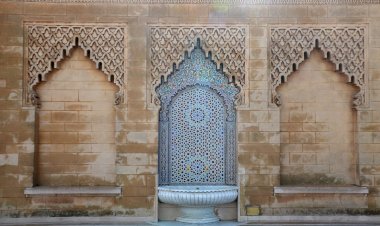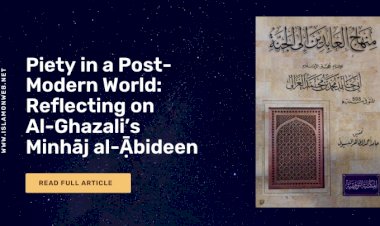Journey Within: Exploring Inner Pilgrimage in Islam and Christianity
Across the spectrum of major faith traditions worldwide, such as Islam, Christianity, Hinduism, Buddhism, Taoism, and others, there is a common emphasis on the concept of wayfaring and pilgrimage. This notion revolves around the idea of undertaking a physical journey motivated by religious faith. Peregrinatio, reminiscent of the significant Ḥajj in Islam, is widely understood and discussed by both devoted followers and knowledgeable scholars. It involves a sacred journey to revered destinations like Jerusalem and Mecca, symbolizing the profound spiritual connection between believers and the sacred sites they visit, thereby enriching their faith and devotion. Is pilgrimage solely about embarking on physical journeys from one place to another in the pursuit of divine grace? Notably, within Islamic and Christian traditions, some scholars have offered interpretations that emphasize the inward, esoteric, or metaphorical aspects of pilgrimage, framing it as a profound quest for a way of life that extends towards eternal spiritual growth.
John Bunyan, an English writer, preacher, and one of the most significant figures in English literature and religious history, in his allegorical Christian novel "The Pilgrim's Progress" translated the pilgrimage into an allegorical struggle with the self. Likewise, Ali Shariati, an Iranian sociologist and philosopher who is known for his innovative interpretation of Islam and his advocacy for the application of Islamic principles to contemporary social and political issues, in his public lectures and writings expressed Ḥajj as a spiritually transformative experience. The same narrative can be traced in the writings and treatises of many Sufi figures ranging from Islamic and Christian traditions. A pilgrimage may be a rite of passage involving transformations of one's inner state and outer status; it may be a quest for a transcendent goal; it may entail the long-desired healing of a physical or spiritual ailment.[i] Pilgrimage, therefore, is an inward, spiritual journey towards eternity, nirvana or being abstinent from worldly pleasures.
Ḥajj: The Islamic Pilgrimage
Ḥajj, one of the Five Pillars of Islam, is an obligatory act of worship for Muslims who are physically and financially capable. It takes place annually in Mecca, Saudi Arabia, during the Islamic month of Dhul-Hijjah. The Ḥajj, rooted in the actions and sacrifices of Prophet Ibraham (a.s.) and his family, emphasizes the universal message of submission to Allah. It fosters a sense of unity among millions of Muslims from diverse backgrounds, demonstrating the strength of communal devotion and faith. Despite the religious, geographical, and cultural differences, the believers from every nook and cranny of the universe throng around Ka'ba to unveil the cosmopolitan values Islam highlights.
The above description of Ḥajj as an act of worship is the exoteric meaning of the term and what accords to Islamic Shariah. It has a different connotation too; esoteric, inward, and spiritual. Rather than a spatial journey a Muslim undertakes to Ka'ba, Ḥajj is a process of self-discovery that gives the idea of leading a life free from material pleasures and worldly affairs. This way of life is explicitly stated by Prophet Muhammad ﷺ as he advised Abdullah bin Umar (r.a), "Be in this world as if you were a stranger or a traveler".[ii] It is explicit that a traveler is not concerned about the house he stays and the food he eats since it is temporary to him. Pondering over this hadith, a believer can explicitly comprehend that the Prophet ﷺ asks his Ummah to lead a simple life in this world, dunya, like a traveler who does not care about the temporary facilities and luxuries of this world because this world, to him, is not his real home. To him, the Hereafter world is the real, permanent and eternal.[iii] In this light, pilgrimage takes on a profound essence—a longing to reach an eternal destination in the Hereafter, one brimming with abundant blessings. Thus, a Hajji's journey is a perpetual quest for a rich and enduring eternity. This particular understanding of pilgrimage gives rise to a way of life that is considered exemplary, flawless, and exceptional. In this context, the pilgrim consistently avoids actions that bring unhappiness and suffering to society and its people, such as warfare, conflicts, extravagance, and acts of terrorism. Furthermore, the pilgrim upholds values that are free from selfishness, greed, jealousy, and dishonesty.
Spiritual connotation of pilgrimage in Christianity
In Christian tradition, Peregrinus refers to the ancient practice of pilgrimage, where believers embarked on journeys to significant sacred sites associated with Jesus, saints, and biblical events. These pilgrimages were seen as a means to deepen one's faith, seek spiritual enlightenment, and connect with the rich religious heritage of Christianity. Prominent pilgrimage destinations included Jerusalem, Bethlehem, Rome, Santiago de Compostela, and countless others. Each held its own historical and spiritual significance, drawing pilgrims seeking encounters with the divine. The Via Dolorosa in Jerusalem, for example, traces the path believed to be taken by Jesus on his way to crucifixion, providing a visceral experience of his suffering.[iv]
As mentioned in the beginning, there are some scholars within Christianity who reckoned the concept of pilgrimage in a metaphorical sense. To them, pilgrimage, more than an external journey to sacred sanctums, is an internal journey to the self, seeking the ultimate truth and decrypting the ambiguities and mysteries of this material world. John Bunyan stands out prominently among these scholars and writers. His renowned and widely read work, 'The Pilgrim's Progress,' holds a profound place in Christian theological literature. This influential book recounts the tale of a pilgrim named Christian, who embarks on a journey from his hometown, the City of Destruction, towards the celestial realm, the Celestial City. The entire narrative serves as an intricate allegory, symbolizing a spiritual odyssey that transcends the physical world and leads towards the ultimate destination of Heaven. Bunyan's work, in this context, champions the concept of pilgrimage as a profound means of personal transformation and spiritual growth.
Conclusion
The Pilgrimage in Islamic and Christian traditions has to do not merely or mainly with walking a spatial pathway but with a way of life that is inwardly and spiritually enriched and freed from worldly needs. It symbolize unity, equality, and the submission of the individual to the ultimate god, Allah. It is more about the internal journey to ourselves and circumambulation around our deeds than external journey and outward actions. To a Muslim, Ḥajj is a source of strengthened faith, a profound purification of the soul, a constant remembrance of Allah, a reiteration of tawḥīd, and a pathway towards attaining the abundant blessings of the eternal paradise, jannatul firdous. May Allah grant us the privilege to join these blessed pilgrims and bestow upon us the divine toufīq to embark on this sacred journey.
Endnotes
[i] Simon Coleman and John Elsner, Pilgrimage: Past and present in the world religions, Harvard University Press, Cambridge, Massachusetts, 1995, P.6
[ii] Sahih al-Bukhari 6416, b.81, h.5
[iii] Abd al Muhsin al Abbad Sharh al Arbaeen al nawawiyya, 34:5
[iv] Andre Moubarak, One Friday in Jerusalem Walking To Calvary-A Tour, A Faith, A Life; Jerusalem, Israel: Twin Tours and Travel Ltd., p.14
About the author
Sidheeq VP is a postgraduate scholar at Jamia Millia Islamia. He can be reached at sidheeqiklu@gmail.com
Disclaimer
The views expressed in this article are the author’s own and do not necessarily mirror Islamonweb’s editorial stance.
























Leave A Comment